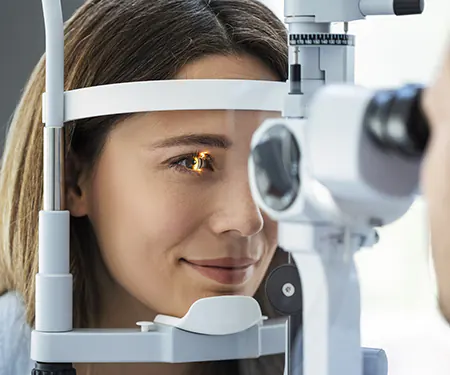Macular degeneration is a common eye disease impacting millions of people worldwide.
Did You Know?
Approximately 1-in-7 Australians aged 50 and over have some evidence of AMD (Age-related Macular Degeneration).
The prevalence of macular degeneration (MD) will increase as the Australian population grows. Therefore, raising awareness of this disease is critical to help people recognize the symptoms and seek early treatment.
Macular Degeneration: What Is It?
Macular degeneration arises when the macula, a small and centrally positioned part of the retina, begins to deteriorate. The macula is responsible for crisp, central vision. We rely on this aspect of our sight for tasks such as; driving, reading, and recognizing faces – life’s necessities! As the macula degenerates, people may experience blurred or distorted central vision, significantly impacting their quality of life.
For the older members of our community, your GP and eye-health experts will often refer to AMD (age-related macular degeneration) in discussing this eye disease. Still, it can affect anyone at any age.
Wet and Dry Macular Degeneration: What You Need To Know
There are two types of macular degeneration: dry and wet. Dry macular degeneration is the most common form, progressing slowly over time. Wet macular degeneration is less prevalent but more severe. It occurs as abnormal blood vessels develop under the macula, leading to rapid vision loss.
Risk Factors
The risk factors for macular degeneration include age, genetics, smoking, and a poor diet. This disease has no cure, but early detection, treatment, and a healthy and balanced lifestyle can help slow its progression and preserve vision. Treatment options include medication injections, laser therapy, and photodynamic therapy (for wet AMD).
As the population ages, the prevalence of MD is expected to increase. Therefore, raising awareness of this disease is crucial to promote early detection and treatment. Optometrists and ophthalmologists play a critical role in diagnosing and managing MD. They should educate patients on the risk factors for this disease and the importance of regular eye exams.
Completing A Basic Risk Assessment
You may be wondering if you fit into a higher-risk bracket. Take a moment to complete this simple assessment online: MACULAR DISEASE FOUNDATION RISK ASSESSMENT, developed by the Macular Disease Foundation Australia.
This basic questionnaire (5 simple questions) may be the simple starting point you need to get the support you deserve for healthy sight. Next, let’s discuss the key to prevention and ongoing vision care.
Your Key To Success: Regular Eye Tests
Regular eye tests play a crucial role in monitoring the health of your macula, which is responsible for clear and detailed vision. Therefore, it’s critical to detect any changes or abnormalities in the macula as early as possible to prevent or treat potential vision loss. In addition, by getting routine eye exams, you can ensure that your macula is regularly checked and any issues are addressed promptly. So take into account the importance of regular eye tests for maintaining your macula health and overall eye health.
In conclusion, macular degeneration is a prevalent eye disease affecting millions worldwide. Early detection and treatment are crucial to preserving vision and maintaining a good quality of life. Therefore, optometrists and ophthalmologists regularly raise awareness of this disease and educate patients on the available risk factors and treatment options.
We want to do our part this month, too. May we encourage you to get some clarity on the quality of your vision and the health of your eyes – particularly as we continue the discussion in the month ahead for May 2023. Keep an eye on our social media and our blog page as we expand on this subject, too!
Do your part by booking an eye test today at The Optical Superstore.
Your macula will thank you for it!









